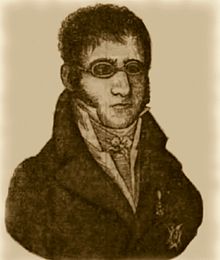Juan Bautista Arriaza y Superviela
Don Juan Bautista Arriaza y Superviela (born February 27, 1770 in Madrid , † January 22, 1837 there ) was a Spanish statesman and poet.
Arriaza y Superviela received his training at the Military Academy in Segovia . Subsequently, he joined the diplomatic corps of his country and in 1798 got a job as legation secretary in the embassy in Paris ; later he moved to London in the same position .
At the end of 1807, after the secret Fontainebleau Agreement , Arriaza y Superviela returned to Spain and took part in the war against Napoleon . From then on he showed himself to be an avid supporter of absolute kingship , which is why King Ferdinand VII appointed him his councilor and cabinet secretary, official in the Ministry of Foreign Affairs and chamberlain and knight.
Arriaza y Superviela died five weeks before his 67th birthday on January 22, 1837 in Madrid.
reception
Arriaza y Superviela's political activity, the principles of which he expressed in the Discursos patrioticos , went hand in hand with poetic activity . As a poet, Arriaza is a master of form rather than an original genius.
Works (selection)
- Las primicias . 6th edition Madrid 1829–32 (2 vols.).
- Emilia . Madrid 1803 (a didactically descriptive poem).
- Cantos Patrióticos . 3rd edition Madrid 1815 (especially the fiery and lively chants which cheered the Spanish guerrillas on to agony against the French).
- Profecía del Pirineo . Madrid 1808 (a political ode equal in power and impact to the Marseillaise ).
- Ferdinand Wolf (Ed.): Floresta de rimas modernas castellanas . Paris 1837 (2 vols., Here especially vol. 2; a selection of lyrical poems).
literature
- Fernando Marcos Alvarez: Don Juan Bautista de Arriaza y Superviela. Marino, poeta y diplomatico, 1770-1837 . Consejo Superior de Investigaciones Cientificas, Instituto de Estudios Madrileños, Madrid 1977.
| personal data | |
|---|---|
| SURNAME | Arriaza y Superviela, Juan Bautista |
| ALTERNATIVE NAMES | Arriaza, Juan Bautista de |
| BRIEF DESCRIPTION | Spanish statesman and poet |
| DATE OF BIRTH | February 27, 1770 |
| PLACE OF BIRTH | Madrid |
| DATE OF DEATH | January 22, 1837 |
| Place of death | Madrid |
